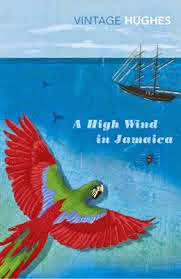
Well this is a totally wild story. Written in 1929, it is like no other novels of that period. And possibly like no novels of any period.
It tells the story of five children who grow up in Jamaica, and is told almost entirely from their perspective. It is therefore weird and unreasonable, and gets even more so when they are sent home to England in a boat, because the boat is taken by pirates, and they are accidentally abducted. The pirates treat them reasonably well, and the trip becomes a sort of strange holiday. One of the kids falls out of a window, and dies, and is never referred to by any of the children again. Another child begins to treat old bits of ship’s tackle as her babies. The oldest girl, almost thirteen, meets the fate common to oldest girls in bad situations. Meanwhile, the book is very merry. It’s like LORD OF THE FLIES, but told cheerfully.
Eventually, the pirates manage to off load the children on a separate ship, and the children are returned to their parents. They recover , while the pirates are jailed. You almost feel sorry for the pirates.
Here’s a little sample of the surreal feel of the book. It’s the very beginning, and I include it in part because it captures something of the social impact of the end of slavery in the West Indies, a subject I never really thought about before, but which also came up in WIDE SARGASSO SEA a little while ago:
One of the fruits of Emancipation in the West Indian islands is the number of the ruins, either attached to the houses that remain or within a stone’s throw of them: ruined slaves’ quarters, ruined sugar grinding houses, ruined boiling houses; often ruined mansions that were too expensive to maintain. Eathquarke, fire, rain, and the deadlier vegetation, did their work quickly.
One scene is very clearly in my mind, in Jamaica. There was a vast stone built house called Derby Hill (where the Parkers lived). It had been the centres of a very prosperous plantation. With Emancipation, like many others, that went bung. The sugar buildings fell down. Bush smothered the can and the guinea-grass. . . . The three remaining faithful servants occupied the mansion. The two heiresses of all this, the Miss Parkers, grew old; and were by education incapable. And the scene is this: coming to Derby Hill on some business or other, and wading waist-deep in bushes up to the front door, now lashed permanently open by a rank plant. . . The two old Miss Parkers lived in bed, for the negroes had taken away all their clothes: they were nearly starved. Drinking water was brought, in two cracked Worcester cups and three coconut shells on a sliver salver. Presently one of the heiresses persuaded her tyrants to lend her an old print dress, and came and pottered about in the mess half-heartedly: tried to wipe the old blood and feathers of slaughtered chickens from a gilt and marble table: tried to talk sensibly: tried to wind the ormolu clock: and then gave it up and mooned away back to bed. Not long after this, I believe they were both starved altogether to death. Or, if that were hardly possible in so prolific a country, perhaps given ground glass – rumour varied. At any rate, they died.
“deadlier vegetation”!
“by education incapable” !
“At any rate, they died”!
I can’t imagine why this weird book isn’t more famous
